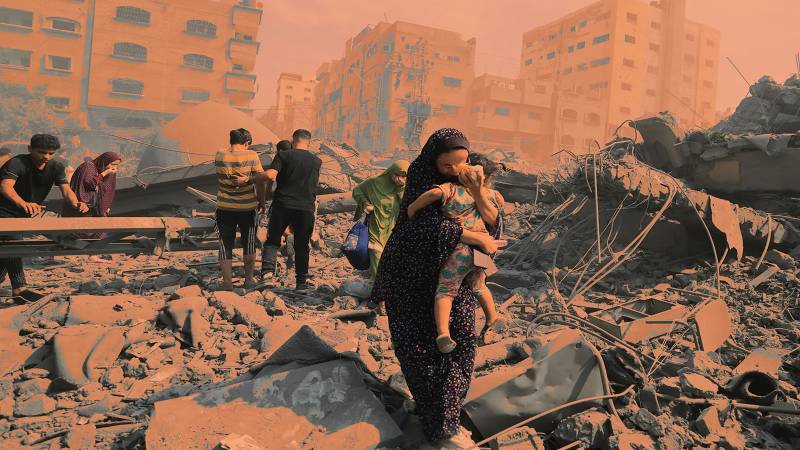
The Gaza Health Ministry officials reported on Tuesday that at least 200 people were martyred in Israeli strikes in the besieged territory in the last 24 hours, with over 50 lives lost overnight, as the bombing in the areas of Rafah and Khan Younis continued. This was in spite of the fact that Hamas released the elderly hostages on Monday night.
At least 200 Palestinians have died as a result of Israeli attacks in Gaza within the past 24 hours, according to officials of the health ministry in Gaza.
Furthermore, the health ministry reported that since Israel began bombarding the Gaza Strip on October 7, over 18,000 Palestinians have been injured.
Hani Abu Isheba of Al Jazeera said, "This has put hospitals here on the verge of collapse." This degree of injury has never been witnessed in local hospitals.
Over 5,000 Palestinians have been killed in more than two weeks of heavy Israeli shelling of the Gaza Strip; the majority of these casualties were civilians. Those who have survived the fighting are confronting hunger and are having difficulty accessing basic supplies like clean water and medication.
Prior to the start of the most recent Israeli bombing campaign on October 7, which followed fatal Hamas strikes within Israel, over 60% of Gaza's inhabitants were in need of food aid.
Israel declared on Tuesday that it will not be reducing its shelling of the beleaguered Palestinian enclave, even after raids on Gaza left scores of Hamas fighters dead overnight.
Israel has been asked by the US to send additional supplies to Gaza, which is experiencing a humanitarian catastrophe as a result of frequent Israeli assaults.
But amid the most bloody Israeli-Palestinian confrontation in decades, there is no quick chance of a truce. Complicating matters, Israeli forces are awaiting instructions for a ground attack.
According to the Israeli military, it destroyed approximately 400 targets in Gaza throughout the course of the night, killing scores of Hamas members, three of whom were deputy battalion leaders.
US Marine Corps Lt Gen James Glynn, the former head of Marine Troops Special Activities Command, is scheduled to advise the Israeli troops on their present activities as the Israel Defence Forces (IDF) get ready for a ground invasion of Gaza, a US official familiar with the situation said.
The US official who first disclosed the information disclosed that Glynn, the deputy commandant for Reserve Affairs and Manpower, is qualified to provide counsel on the "big picture" of the Gaza battle.
When questioned about Glynn's intention to advise the Israelis, National Security Council spokesman John Kirby declined to clarify Glynn's stance.
Hamas on Monday freed two Israeli women among the more than 200 hostages taken during its October 7 attack. They were the third and fourth hostages to be released.
Calls for a ceasefire in the Gaza conflict have been rebuffed by the US, which has warned that doing so will help Hamas and allow them time to reorganize.
A truce, according to State Department spokesperson Matthew Miller, would give Hamas time to reorganize and carry out more terrorist strikes against Israel.
He highlighted how difficult it is to accept a ceasefire given the tough security circumstances Israel finds itself in as a result of Hamas's continuous onslaught.
Today, French President Emmanuel Macron traveled to Tel Aviv to declare his nation's "complete solidarity" with Israel in the wake of Hamas strikes on October 7 that left many dead and created a humanitarian disaster.
After visiting with the relatives of the French victims upon his arrival at Tel Aviv's Ben Gurion airport, Macron had a meeting with President Isaac Herzog in Jerusalem.
Macron spoke with his Israeli counterpart in Jerusalem and declared, "France will stand in solidarity with Israel in its fight against terrorism."
Macron declared, "What happened will never be forgotten," alluding to the roughly 1,400 individuals that Hamas killed during its attack on Israel; thirty of them were French citizens. "I am here to express our solidarity."
According to the International Organisation for Migration, since the crisis in Gaza began, there have been about 20,000 internal displacements in Lebanon due to the rising violence on the Lebanese-Israeli border.
These displaced people have mostly come from the south of Lebanon, while some have also come from other places. Israeli officials have begun evacuating cities and localities in Israel's north at the same time.

